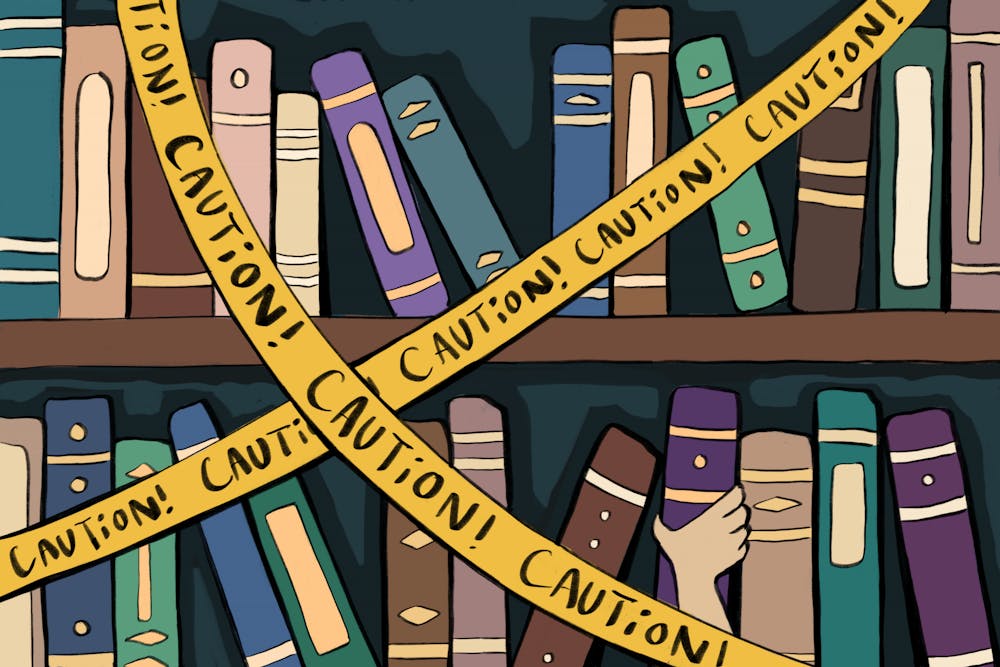Flying off shelves: Read these banned books

On Oct. 6, Fondren Library is collaborating with Rice’s Center for the Study of Women, Gender, and Sexuality to present a Banned Books Read Out, where Rice members will read excerpts from their favorite banned or challenged books. In honor of this event, the Thresher has rounded up a list of banned books. The titles are accessible on campus or through Fondren Library’s database, in case you find yourself looking for some new reads during midterm recess.
All Boys Aren’t Blue
“All Boys Aren’t Blue,” a self-coined “memoir-manifesto” written by queer journalist and activist George M. Johnson, is a series of personal essays about Johnson’s journey growing up queer and Black. The novel traces formative experiences in Johnson’s life, from childhood bullies to their first love. “All Boys Aren’t Blue” has stirred controversy over its profanity and sexually explicit material, along with its depictions of LGBTQ+ content and gender identity.
The Hate U Give
Inspired by the Black Lives Matter movement and later adapted into a film, Angie Thomas’s “The Hate U Give” focuses on 16-year-old Starr Carter who witnesses a police officer fatally shoot her childhood friend. Starr’s life is upended in the aftermath of the shooting as she grapples with the effects of police brutality locally and nationally. Although the novel has been widely praised as a social commentary on systemic racism and discrimination, it has been challenged by critics and was banned by school officials in Katy, Texas for violence, vulgar language and promoting supposed anti-police messages.
The Bluest Eye
“The Bluest Eye,” Toni Morrison’s debut novel, tells the story of Pecola Breedlove, an African-American girl growing up in an abusive household in rural 1940s Ohio. Pecola grapples with inferiority complexes and beauty standards, wishing for light skin and blue eyes. Created as a tale about Black girlhood, “The Bluest Eye” has been banned in multiple states for its discussion of topics of child molestation, incest, rape and racism.
Lolita
“Lolita,” published in 1955 by Vladimir Nabokov, portrays Humbert Humbert, a French professor, in postwar America. He falls in love with Lolita, a 12-year-old girl, and strikes up a disturbing and convoluted romantic relationship with her. The novel functions as a journal for Humbert Humbert to detail his growing obsession and affair with the “nymphet.” “Lolita” has been deemed one of the most controversial books to be published in the past century, largely for its exploration of pedophilia, incest and sexual violence.
Beloved
“Beloved,” another of Toni Morrison’s critically acclaimed novels, portrays a woman witnessing hauntings in her family home. Sethe, the novel’s protagonist, is a former slave who, despite fleeing her former life, still struggles with the memories of being enslaved. While exploring the traumas of motherhood and slavery, “Beloved” has also come under fire for profanity, violence, references to bestiality and sexually explicit content.
Lawn Boy
“Lawn Boy,” by Jonathan Eviston, witnesses a young Mexican-American worker named Mike Muñoz get fired from his job with a landscaping crew. Mike is then placed on a journey of self-discovery in an attempt to find himself and achieve the American Dream. Tracing a young worker’s path throughout America’s cuttingly capitalist society, “Lawn Boy” has been celebrated for dealing with topics such as classism and sexual identity. However, it has been criticized and challenged for profanity and sexually explicit LGBTQ+ content.
The Color Purple
Narrated as a series of letters to God, Alice Walker’s epistolary novel “The Color Purple” sees 14-year-old Celie growing up in rural Georgia in the early 20th century. Facing poverty and abuse from her father, Celie seeks comfort in the relationships she cultivates with the women in her life: her sister, Nettie, and her lover, Shug. “The Color Purple” has received backlash for depicting incest, rape, violence, LGBTQ+ content, profanity and drug abuse.
More from The Rice Thresher

Beer Bike ‘bragging rights’: meet the RPC coordinators
Beer Bike ‘bragging rights’: meet the RPC coordinators

Beer Bike ‘bragging rights’: meet the RPC coordinators
Beer Bike ‘bragging rights’: meet the RPC coordinators

Alice Owens talks women’s rugby and engineering
Alice Owens said she thrives most when adrenaline courses through her veins. Founder and president of the Rice Women’s Rugby Club, her journey at Rice began with several intramural sports, but it was Powderpuff that left the deepest mark.

Please note All comments are eligible for publication by The Rice Thresher.